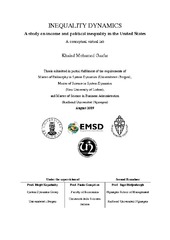Inequality dynamics: A study on income and political inequality in the United States (A conceptual virtual lab)
Master thesis
Date
2019-08-30Metadata
Show full item recordCollections
- Department of Geography [668]
Abstract
Post-tax income inequality in the US has been rising since the mid-1970s at a rate higher than most industrial democracies. Government policy has contributed to, and failed to restrict this trend despite popular concern for the issue of increasing inequality, and against public preferences for progressive taxation. Recent empirical findings have detected a wealth-bias in US policy-making as a result of several factors including low voter participation by low-income earners, political party structure and practices, the role of money in elections, and in lobbying. This research aimed to structure the knowledge on how income inequality translates to political inequality, and vice versa, through a closed-boundary, white-box theory using System Dynamics. Its findings provide a theory explaining the success to the successful phenomenon observed in empirical data, using on a free-market approach to political campaigns and lobbying in the US. The heterogeneity of political behaviour across income groups are the main reason for this divergence in political influence, as well as incomes, of different income groups. Attitude changes towards political spending by low income earners in the US have been shown to be insufficient to reduce the trend of rising inequality. Testing two policies of campaign finance reform, the results of this study indicated that campaign finance reform will have unintended consequences shifting the money from campaigns to lobbying, reinforcing the idea that campaign finance and the lobbying industry exist on a continuum on which money is turned to influence.
